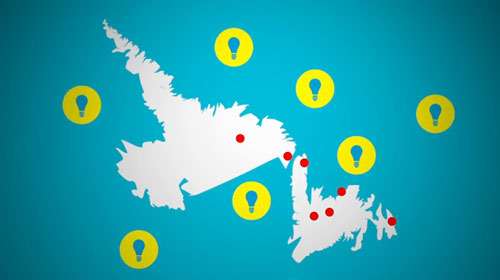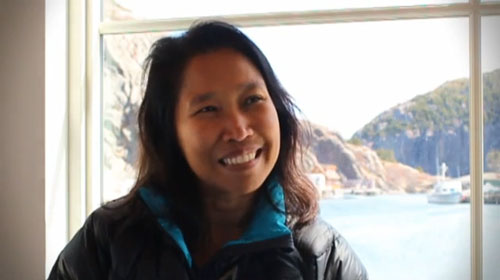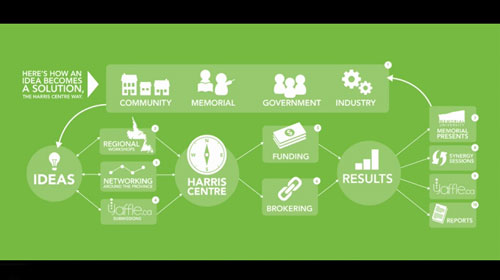So what exactly is public engagement? Public engagement is collaboration between the public and Memorial that furthers Memorial’s mission. It’s collaboration that draws on the knowledge and resources of everyone involved. It’s collaboration that involves mutual respect, mutual contributions and mutual benefits for all participants.
How does this apply to Memorial? It’s simple. Memorial is a public institution dedicated to serving the public good. By encouraging and supporting publicly engaged work, Memorial is fulfilling its special obligation to the people of Newfoundland and Labrador.
Still unsure? Take a second to watch this quick video and things will make more sense. You can also learn more about public engagement at Memorial through our Public Engagement Framework. Discover how you can get involved.
A video introduction to public engagement.
Engage Memorial was an insightful week of events launched in February 2013 and dedicated entirely to celebrating public engagement with the public and the university.

The crisis faced by fisheries is a much larger and more complex issue than most people would imagine. Dr. Ratana Chuenpagdee is well aware of the plight of global fisheries and she attempts to emphasize the importance of small-scale fisheries in our global economy. Working alongside willing members of the community to make a positive impact within the global fishing industry, public engagement has become core to her work. As the Canada Research Chair in Natural Resource Sustainability and Community Development, Dr. Chuenpagdee is a member of the Department of Geography, as well as the project director for a six-year, $2.5-million Social Sciences and Humanities Research Council funded project called Too Big to Ignore (TBTI): Global Partnerships for Small-Scale Fisheries Research.
This project involves researchers from 30 countries, and 15 partners, including intergovernmental organizations, research and academic institutions, environmental and non-governmental organizations, and draws inspiration directly from the community. Dr. Chuenpagdee and the TBTI team will emphasize the issues faced by small-scale fisheries — particularly those often ignored in policy discussions — and address the necessity of maintaining livelihood support and food security, not only along the shores Newfoundland and Labrador, but also throughout the world.
Dr. Ratana Chuenpagdee talks about the marginalization of small-scale fisheries.
It’s no secret. There’s a serious demand for doctors in rural communities throughout the country, and Newfoundland and Labrador is no exception. Thankfully, medical graduates from Memorial make up almost half of this province’s doctors. This year the Faculty of Medicine has been honoured by the Society of Rural Physicians of Canada (SRPC) with the Keith Award, given annually to the Canadian postgraduate medical program that has excelled in producing the largest number of doctors practising in rural communities 10 years after completion of training.
The Faculty of Medicine’s family medicine training program responds to community needs by introducing new MD graduates to the province’s many rural towns that are facing a shortage of doctors. Many graduates continue to stay on in those placements as they develop relationships with patients and build a home for themselves amongst the community. This is the fifth time Memorial has received this prestigious award since it was introduced in 2000, and it most certainly won’t be the last.
Starting a business from scratch is undoubtedly daunting for anyone, especially for people who have recently experienced the potential stress of military employment. Based in Business is an entrepreneurial boot camp run by Enactus Memorial, in partnership with the Canadian Youth Business Foundation (CYBF), where medically-discharged and soon-to-be-retired Canadian Forces members transition from the military to the business world with assistance from a number of Faculty of Business Administration professors, students and industry professionals.
Recognized by The Prince of Wales, through The Prince's Charities Canada, as the best entrepreneurial transition program in Canada, Based in Business was created in response to a need identified by the Department of National Defence. It teaches budding entrepreneurs all the business basics, from marketing and financing to human resources. Participants also engage in one-on-one assistance with student volunteers to craft concrete business plans. Supplies for the program are generously sponsored by various community business owners, who are also encouraged to share their own entrepreneurial experiences.
This week-long, all-expense-paid residential program is now in its fifth summer and is currently expanding; both Université Laval and the Paul J. Hill School of Business at the University of Regina hosted Based in Business boot camps this past August.
Memorial University’s Leslie Harris Centre of Regional Policy and Development is an organization within the university that seeks to connect the community with the right researchers, supporters and funders to see a project reach its full potential. Take a moment to discover how you can bring your ideas to life or how to submit them now to Yaffle.
Here’s how an idea becomes a solution, The Harris Centre way.
Memorial is deeply committed to public engagement. Many of our students and employees are actively involved in partnerships and collaborations with members of the community and have found some pretty interesting ways to connect and accomplish great things.
Allison Eaton, manager of Memorial’s Bonne Bay Marine Station, heads up a team of talented and devoted researchers and students that hosts more than 11,000 tourists annually at the facility, educating them with an interactive aquarium and taking visitors out on boat tours. Allison takes great pride in the station’s activities. Every June, the team collaborates with other sponsors to host a community cleanup at nearby Wild Cove Beach. The station is also engaged in research for recovery of fish stocks and strategies to aid fishing communities. Allison recognizes that community participation is crucial to the station’s sustainable development and in aiding fishing communities.
Dwight Howse, head of the School of Ocean Technology at the Fisheries and Marine Institute of Memorial University, believes that the only way to directly engage youth with ocean technology is to help them get their hands wet. Literally. Dwight works alongside a team from the Marine Institute and the public school system to guide and mentor teams of local high school students in designing underwater remotely-operated vehicles (ROV) to compete against other students around the world. The International ROV Competition exposes students to real-life scenarios and challenges. Students are encouraged to think like entrepreneurs, treat their teams like companies and pursue their ideas as though they were marketable solutions. This hands-on approach is very effective; many participants go on to enrol in the Remotely Operated Vehicles Technician Diploma Program at the institute. Dwight believes that whether the students are competing or training, hands-on engagement is essential for growth.
Rudy Riedlsperger, a graduate student in Memorial's Department of Geography, knows the importance and vulnerability of northern Labrador's winter trails, as they provide necessary access to hunting grounds, ice fishing spots and firewood areas. He works with communities in Nunatsiavut to build local capacity and the skills required to improve long-term environmental, social, and economic sustainability of remote communities located in the Canadian Arctic and Subarctic. His graduate work identifies current barriers to community involvement in the assessment and mapping of landscape hazards that threaten individual and community livelihoods, including resource constraints, research fatigue, and barriers related to communication.







